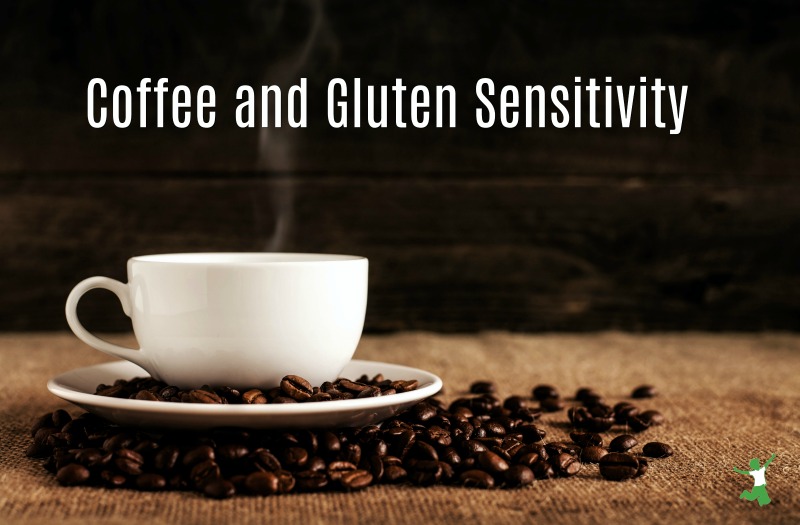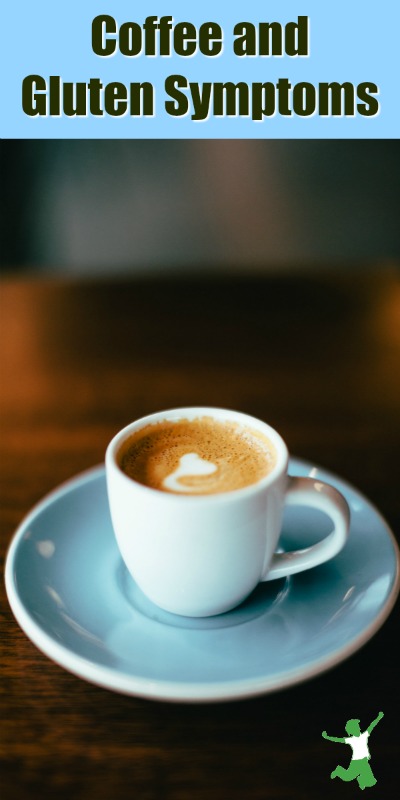Table of Contents[Hide][Show]
Coffee should be avoided by those who are Celiac and many who suffer from wheat sensitivity as it contains cross-reactive proteins to gluten.

If you drink coffee, even bulletproof coffee and have gluten sensitivity or celiac, you might want to sit down for this one.
There is a surprising connection between gluten and coffee that is by and large ignored by the health community. This revelation holds ramifications for other autoimmune disorders as well.
The problem has nothing to do with caffeine, so decaf coffee would be included in this discussion.
In a nutshell, fairly recent lab research has revealed that 10% of coffee is a protein that cross-reacts with gluten antibodies.
This means that if you are gluten sensitive or celiac and are avoiding gluten-containing grains or perhaps have even gone completely grain-free if you still drink coffee there is a strong likelihood that the protein in the coffee is triggering the very same gluten-related health problems you are trying to avoid.
In other words, even if you think you are doing fine with your current gluten-free diet, it is very possible that skipping the coffee could take your health to the next level.
Symptoms of Gluten Sensitivity
Most people who are gluten sensitive don’t realize it because gastrointestinal problems like burping, gas, tummy upset, or toilet issues are the least common way for gluten issues to present themselves!
The most common symptoms of gluten sensitivity?
Migraines and other neurological issues – even MS!
Hormone and endocrine problems are another common way for gluten issues to manifest themselves.
How Coffee Triggers Gluten Sensitivity
So what exactly happens when a gluten sensitive person eats gluten?
Folks with gluten antibodies react to any gluten in the diet by mounting an immune response. This means that gluten is perceived by the body as an invader and the gluten antibodies attack the gluten itself trying to destroy it. This gluten attack is an inflammatory response and inflammation issues can occur anywhere in the body in any tissue or organ.
Here’s the real shocker I came across when researching the coffee/gluten connection:
According to Dr. David Clark DC, functional neurologist and endocrinologist:
There’s not a disease or health condition you can think of that does not have an association – in the research literature – with gluten sensitivity.
That’s a very strong statement!
In essence then, if you are gluten sensitive in any way shape or form, and it seems that most people are whether they know it or not given the epidemic levels of autoimmune issues today, gluten antibodies have the potential to react to proteins in other foods as if they are gluten thereby triggering an immune and inflammatory response.
The protein in coffee is the most common cross-reactor for gluten. Because it is the protein in the coffee that is the trigger, switching to decaf coffee does not solve the problem. Apparently, instant coffee is the worst offender.
Is it possible to be gluten sensitive and not cross-react to coffee? Yes, it’s possible but you’ll have to do some expensive lab testing with a knowledgeable doctor to find out.

Reference
Journal of Food and Nutrition Sciences
More Information
You Probably Need to Change WHEN You Drink Coffee
Coffee Enema
Morning Coffee Fix
Caffeine and Chronic Back Pain
Healthy Coffee Substitutes








Worst coffee ever
Mahrya LeSuer, check this out
Don’t laugh, but my husband came home from work with a new idea for coffee a co-worker told him about. Roasted okra! I said to him, I will ask Healthy Home Economist about it. So, what do you think?
I just read the study that forms the basis of caution for coffee, and Ms. Gedgaudas’ comments are spot on. For those with gluten sensitivities or CD, here is the summary (as quoted and slightly paraphrased from the study):
Instant coffee is contaminated with traces of gluten. Don’t drink it. However, drinking pure coffee may be safe for individuals with gluten sensitivity and celiac disease as long as these individuals do not have classical allergy to coffee. [My advice then: buy organic coffee in whole bean form, then grind right before brewing–and this for both health and enjoyment reasons.]
If you’re on a gluten-free diet and do not show improvement in you’re GI or other symptoms, attention should be given to dairy and other cross-reactive foods, such as yeast, corn, oats, millet and rice.
…
Rebekah Thornquist Tamara Thornquist Cora Nicole Thornquist Benjamin Johansen
Your source has since updated his information: http://drclark.typepad.com/dr_david_clark/2013/10/the-danger-of-coffee-gluten-sensitivty-new-updated-april-2013.html
Meag Olson how depressing lol! I love my coffee. Guess I better start getting use to tea
very interesting. I had eliminated coffee for over 2 months and recently began just having one cup a day before my tea..and my sensitivity symptoms have returned. I was attributing it to the limited wheat in my diet..back to tea only today to see what happens.
Well I am a very sensitive Celiac and coffee doesn’t bother me at all or cause any evidence of damage. My Dermatitis Herpetiformis would pop up with a vengeance if it did, every time I get glutened it shows up a few days after the “spewing from all orifices” stage is over. I am pretty sure that the coffee crossreactivity idea has been debunked quite a few times by reputable scientists as well. I know several other Celiac coffee drinkers who are also fine, so I’m no unicorn.
Very interesting article. Something to look into further. I really detest tea and my body doesn’t like it either….guess it’s water to the rescue!!!! I have also found that teas aren’t so innocent either for our health. Reactions I’ve had to teas has kept me away from them for years.
Siri Kiviranta